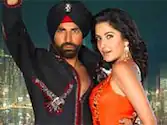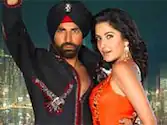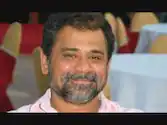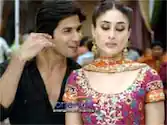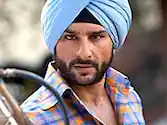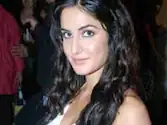"Mukesh Bhatt jokes that I am like a Tirupati ka naayi"- Pritam
His hot innings continue with Jannat, Race, Kismat Konnection, Singh Is Kinng and the year's biggest grosser, Golmaal Returns. With over 12 big films to come, the Pritam record plays on...
Golmaal
Returns
is
a
huge
hit,
but
the
best
song
Tu
saala
was
not
in
the
film.
How
do
you
feel
when
such
things
happen?
Obviously
I
feel
very
bad,
because
such
a
song's
life
is
finished
and
it
goes
waste.
But
I
am
lucky
that
the
song
still
became
popular.
Rohit
(Shetty)
wanted
to
film
this
song
in
a
big
way
with
the
use
of
Motion
Picture
Control
technology
as
multiple
Kareena
Kapoors
haunt
Ajay
Devgan
when
he
goes
to
a
pub
after
one
of
their
fights.
But
for
various
reasons,
they
scrapped
the
song.
After
hot
soundtracks
like
Dhoom
and
Dhoom:2,
what
went
wrong
in
Sanjay
Gadhvi's
Kidnap?
I
guess
Sanjay
and
I
wanted
to
relax
and
not
be
ambitious
the
way
we
had
been!
Sanjay
gave
my
ex-partner
Jeet
and
I
our
debut
film
Tere
Liye
and
introduced
us
to
Aditya
Chopra
who
gave
us
our
breakthrough
film
in
Mere
Yaar
Ki
Shaadi
Hai.
When
Jeet
broke
away,
Sanjay
gave
me
Dhoom,
and
after
the
successs
of
Dhoom
there
was
obvious
pressure
to
excel
in
Dhoom:2
as
well.
So
we
sort
of
took
it
easy
this
time!
Does
hit
music
make
a
film
or
the
other
way
round?
Good
music
definitely
gives
a
boost
to
a
film's
opening.
Then
if
the
film
is
a
hit,
the
music
works
even
better.
How
would
you
define
the
elements
of
good
music?
I
think
that
a
good
composition
definitely
works
first,
but
good
singers
can
lift
it
further,
for
the
same
composition
will
work
better
with
better
vocals
and
vice-versa.
After
that,
a
whole
lot
of
elements
take
over.
The
orchestration
also
makes
a
difference,
less
because
of
its
quality
and
more
because
of
how
it
resonates
with
the
listener.
Finally
the
lyrics
make
a
song
live
on.
Lyrics
are
very
important.
I
recall
making
25
tunes
in
two
days
in
a
closed-door
sitting
and
remembering
only
a
couple
of
them.
But
when
the
words
were
written
I
recalled
each
one.
As
things
stand
today
in
your
career,
what
kind
of
music
can
we
look
forward
to
from
you
in
2009-2010?
I
think
that
romantic
songs
will
return
in
a
big
way,
but
in
a
new
form,
like
with
a
rock-meets-lounge
flavour.
But
there
is
so
much
Punjabi
infiltrating
into
your
music
that
people
have
started
calling
you
Pritam
Singh!
Laughs)
When
I
went
to
Delhi
for
a
series
of
shows,
the
posters
and
invites
both
said
"Pritam
Singh
Live
In
Concert"!
(Laughs
again).
I
supposed
my
long
hair,
beard
and
my
name
-
Pritam
is
common
in
Punjab
-
combined
to
do
the
trick
along
with
the
Punjabi
songs
I
have
done
in
so
many
recent
films
from
Jab
We
Met
and
Race
to
Kismat
Konnection
and
Singh
Is
Kinng.
Is
this
overdose
of
Punjabi
pop
justified?
I
guess
the
Punjabi
language
is
a
peculiar
mix
of
percussiveness
and
sweetness.
Ramesh
(Taurani)ji
often
jokes
that
when
you
are
stumped
for
words,
Punjabi
phrases
are
the
best
way
out!
Then
Jab
We
Met
and
Singh
Is
Kinng
needed
that
flavour,
as
does
Anurag
Singh's
film
that
I
am
doing
for
Yash
Raj
with
Shahid
Kapoor
and
Rani
Mukerji.
On
the
other
hand,
many
of
my
melodies
acquire
that
flavour
only
because
of
the
lyrics
and
later
the
visuals,
like
Move
your
body
now
in
Kismat
Konnection
which
was
never
composed
with
Punjabi
lyrics
in
mind.
And
what
is
Punjabi
about
Mauja
hi
mauja
from
Jab
We
Met?
It's
an
R&B
song,
but
the
rest
of
the
content
did
the
trick.
You
say
that
a
good
singer
lifts
a
song,
but
your
generation
of
composers
also
use
off-key
singers,
non-singers
and
also
those
whose
Hind
and
Urdui
dictions
are
pathetic.
Why
is
that?
I
think
that
it's
all
a
part
of
working
with
new
voices
and
new
textures.
Personally,
though
I
may
be
wrong,
I
find
flawed
diction
quite
cute.
Unusual
phonetics
can
make
a
song
sound
more
appealing.
Take
Bakhuda
tumhi
ho
from
Kismat
Konnection.
Alka's
gentle
voice
seems
such
a
welcome
relief
after
Atif's
off-key
rendition
and
poor
diction.
Alkaji
told
me
that
she
got
more
appreciation
for
this
song
than
so
many
of
her
hit
solos.
(Laughs).
But
in
this
case
there
were
two
aspects
that
people
do
not
know:
one,
that
normally
duets
are
in
the
middle
octaves
as
they
balance
the
higher
female
pitch
that
often
starts
a
duet
and
the
lower
male
scale.
But
I
designed
this
composition
with
a
high
male
pitch
and
a
low
female
scale.
The
second
aspect
was
that
originally
Alkaji
was
to
start
the
song,
which
is
why
you
hear
Atif
singing
unusually
low.
I
had
recorded
two
versions
with
Atif,
but
the
producers
insisted
on
the
one
I
liked
less.
You
have
been
over-busy.
Does
that
stress
you?
It
does,
though
I
thankfully
never
lose
my
temper.
But
the
workload's
begun
telling
on
my
health
and
from
January
2009,
I
will
concentrate
on
five
films
a
year
and
complete
one
score
at
a
time!
Mukesh
(Bhatt)ji
jokes
that
I
am
like
a
"Tirupati
ka
naayi"
(a
barber
from
Tirupati)
who
cuts
a
little
hair
at
a
time
and
moves
on
to
the
next
customer,
so
that
none
of
them
is
able
to
leave!
(Laughs
again).
Billo
Barber
is
your
next
big
release.
And
Priyadarshan
is
someone
with
whom
you
have
done
multiple
films
while
it's
a
first
with
Shahrukh
Khan.
How
was
the
experience?
It
was
great.
Shahrukh's
a
fantastic
guy
-
15
minutes
into
our
first
meeting
it
was
as
if
I
had
known
him
for
years!
And
Priyan-sir
is
very
clear
about
his
brief
and
very
quick
about
his
choices.
Despite
so
many
hits,
all
that
people
see
is
how
many
songs
you
'copy'.
Also
mass
composers
like
you
and
Himesh
Reshammiya
as
well
as
Anu
Malik
and
many
older
giants
are
simply
not
respected
as
much
as
those
who
do
less
work
and
have
less
impressive
track-records.
Why?
And
how
much
does
it
hurt?
It
definitely
hurts.
I
admit
that
I
have
taken
many
songs
from
various
sources,
but
every
composer
who
has
done
that
has
also
done
so
much
original
work,
which
is
played
down.
Why
focus
only
on
the
negative?
Jab
We
Met,
one
of
my
biggest-ever
hits,
was
100
per
cent
original.
I have proved that I can make every kind of song -I am not only about club numbers, like it has been the case this year. I have been thinking about this for a long while now and I have made my own study about film music. There was a time when I was starting out and I would be thrilled about making a great, complicated chord, but now I make sure that my producer does not even get to hear it. I have learnt that simplicity works, and making a simple song is the most difficult!
When I came here I had no work, so when good work started coming, I took it on because I know that work will stop coming the day I cease giving hits. So early on, one has to make a choice - of giving simple music because the producer's and film's successes are paramount, or going on a self-indulgent trip and getting the media's laurels! I had no godfather, but Sanjay Gadhvi, Aditya Chopra, Mukesh Bhatt, Anurag Basu, Priyadarshan and Imtiaz Ali came to me because they knew I could deliver. Though it hurts because it is unfair, I have come to terms with the fact that I will not get due respect, like all mass-oriented composers who have suffered the same way.




 Click it and Unblock the Notifications
Click it and Unblock the Notifications






